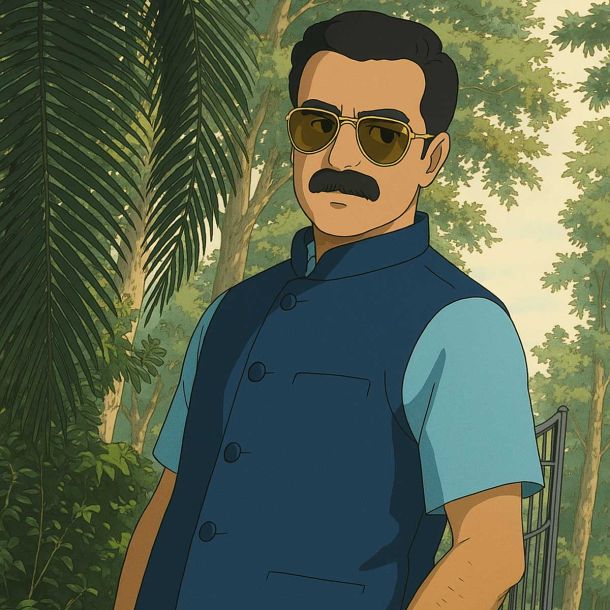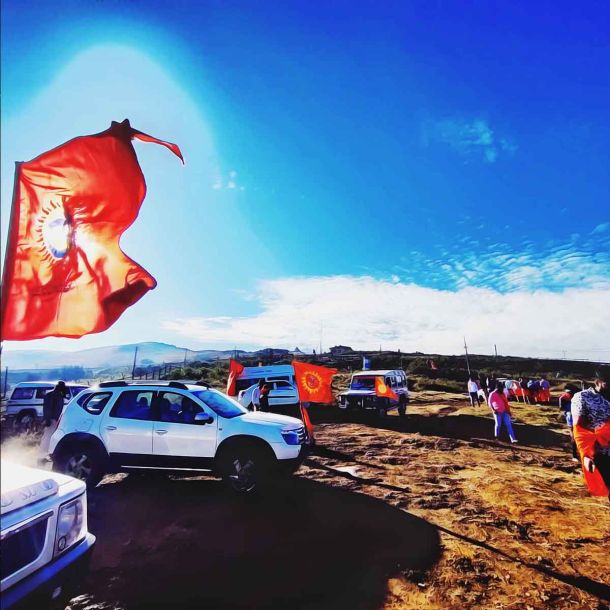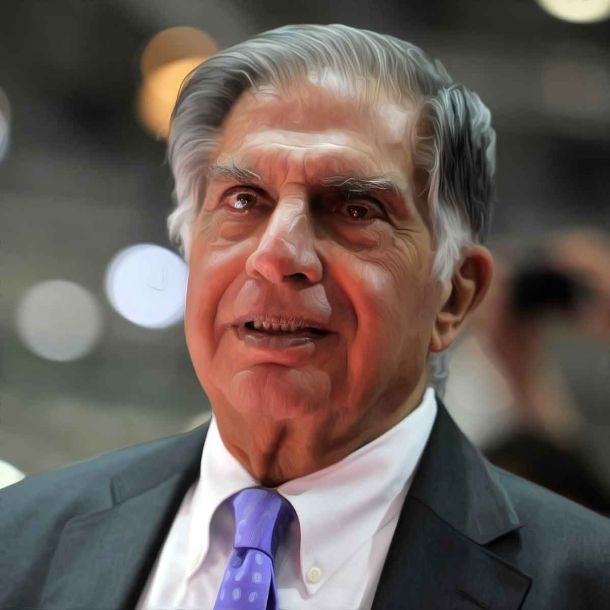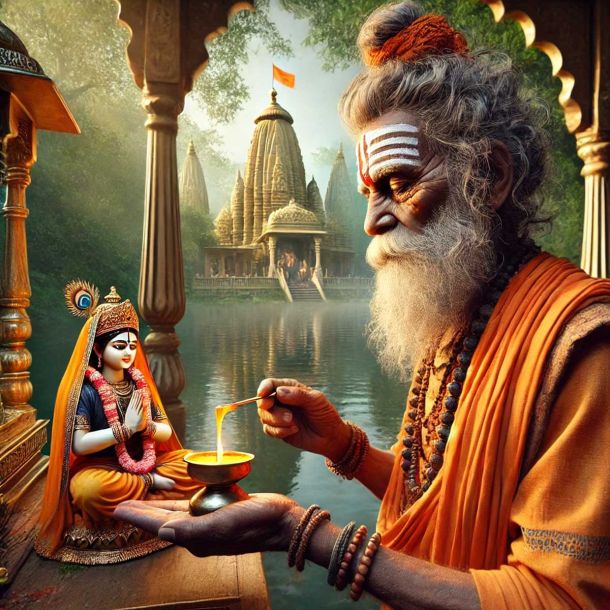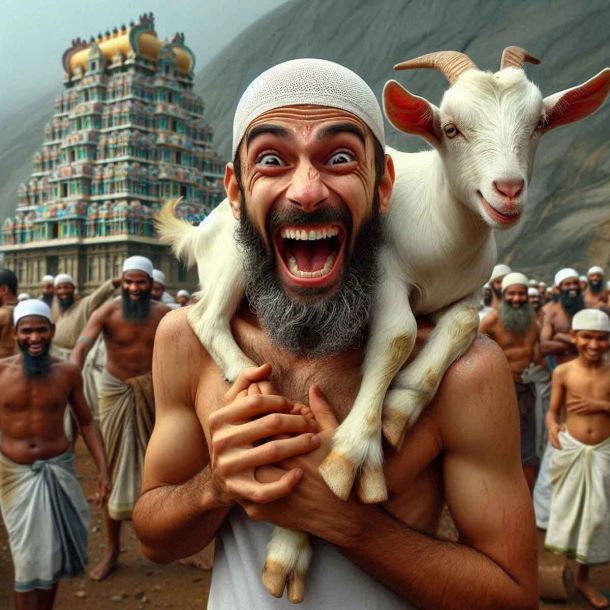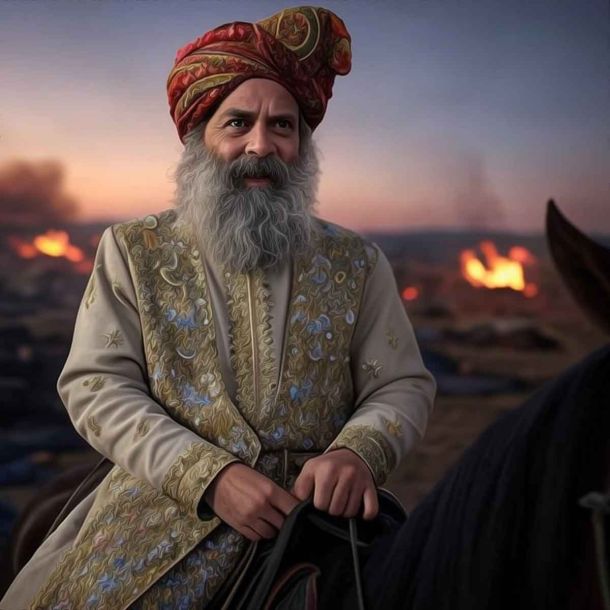More Coverage
Twitter Coverage
Satyaagrah
Written on
Satyaagrah
Written on
Satyaagrah
Written on
Satyaagrah
Written on
Satyaagrah
Written on
Join Satyaagrah Social Media
"The sword of revolution is sharpened on the whetting stone of ideas": Veer Baikunth Shukla, was executed by the British for avenging the death of Bhagat Singh, Sukhdev and Rajguru by killing the traitor Phanindra Nath Ghosh who had become a govt approver
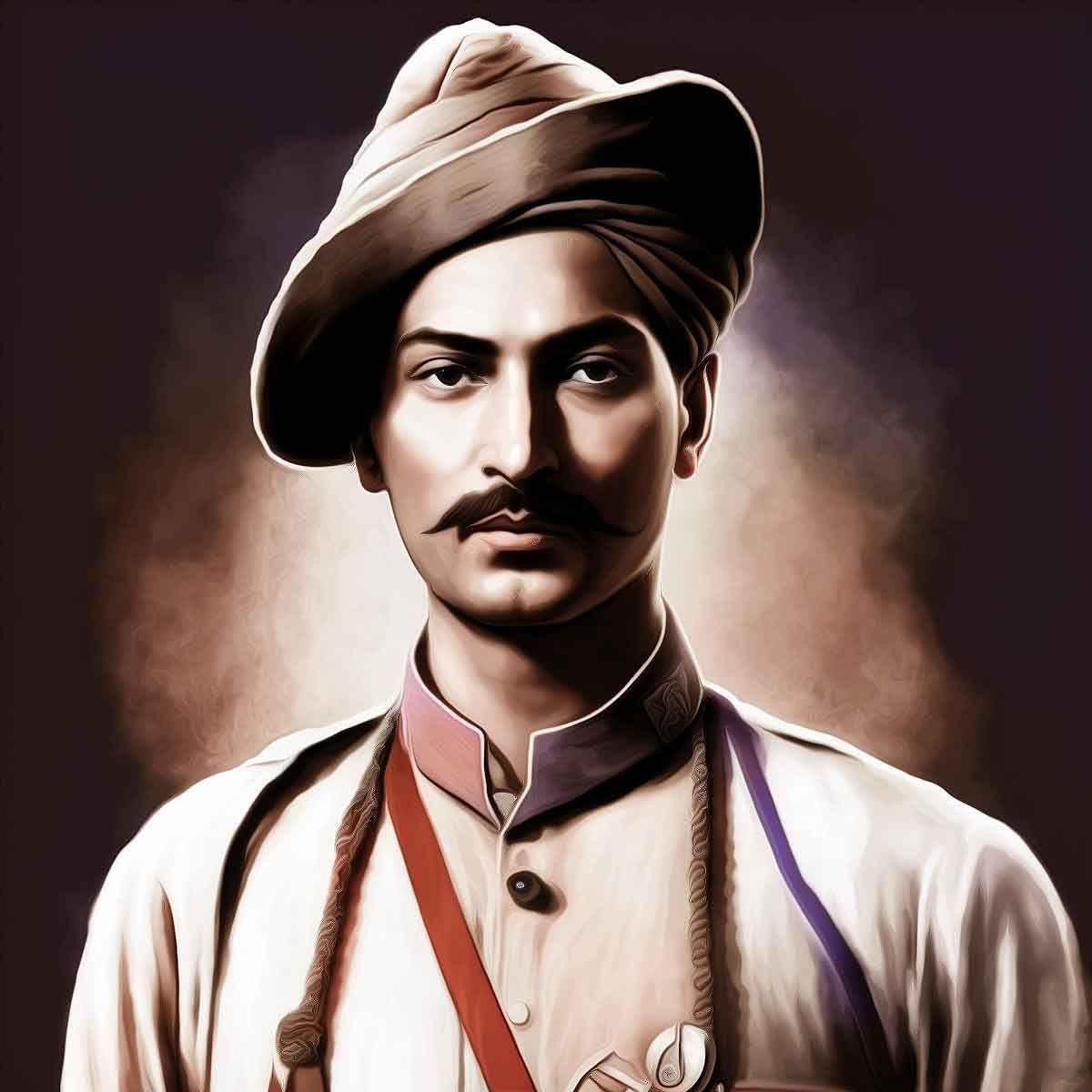
The Tale of Baikunth Shukla and Yogendra Shukla: Have you ever stepped foot in Bihar? Don't make assumptions. I'm not talking about the fabricated image of Biharis that has been unjustly created by corrupt media narratives, foolish portrayals on the silver screen by cinema cliques, and cunning politicians who tirelessly seek personal gain at the expense of mocking and depriving Bihari communities.
Unveiling the Hidden History and Heritage of Bihar Bihar, a land adorned with diverse landscapes and a wealth of cultural heritage, is a masterpiece woven from its countless regions. Mithila, with its roots in mythology, evokes the essence of legends and intertwining history. On the other hand, the vast green fields and majestic mountains of Magadh present a magnificent panorama that reflects the grandeur of Bihar's natural beauty.
Furthermore, Anga's fertile soil and prosperous agricultural land embody the down-to-earth spirit of Bihar's rural heartland, while Patna represents the metropolitan life deeply rooted in the state. And then there is Chota Nagpur, where lush forests and abundant wildlife offer an untouched and untamed magnificence that beckons those yearning to immerse themselves in Bihar's natural world.
All these regions, with their distinct cultural and linguistic flavors, merge together to create the intricate tapestry of Bihar, pulsating within the hearts of millions of Biharis across the globe. This is Bihar, a land of legends, breathtaking natural wonders, and an abundance of rich cultural heritage.
Muzaffarpur: A Land of Contrasts and Passion
Muzaffarpur, a district in northern Bihar, is a place where time appears to stand still, where echoes of the past blend with the sounds of the present, and this vibrant city is renowned in modern-day India as the hub of radiant business and the home of fragrant litchis.
Muzaffarpur is a city steeped in the historical and cultural consciousness of its people, an integral part of their identity for ages, though it bears another name. But that's an entirely different story to delve into here.
Allow me to share some intriguing facts about Muzaffarpur. This city has been mentioned in ancient legends dating back to the time of the Ramayana and even earlier. Hindi classics like "Vaishali ki Nagarvadhu" revolve around the enchanting city and its opulent heritage.
And those towering freedom fighters from Muzaffarpur are Yogendra Shukla and Baikunth Shukla. The Chacha Bhatija duo of Bihar lived a life that resonates with emotions capable of leaving an indelible mark on the pages of history. Their story is one that inspires generations to come, as they exemplify courage and unwavering conviction. However, it is disheartening that we know so little about them, failing to recognize them as the heroes who dedicated their lives to serving Maa Bharti, the motherland, until their last breath.
Gandhi and his challenge: The Post-Non-Cooperation Movement
The 1920s roared with the transformative presence of Gandhi, a leader of epic proportions, who had become a phenomenon reshaping the entire nation. His ethos had ignited an intense sense of patriotic fervor in the hearts of millions of Indians across the globe. Gandhi's unique leadership style and ideology were unprecedented, and many believed they would never witness such greatness again.
However, in 1923, a year after the non-cooperation movement disbanded, a different shade emerged in India and among Indians worldwide. The youth of India, once brimming with energy and hope under Gandhi's guidance, found themselves adrift and bewildered.
They sought a path forward, looking to Gandhi for guidance, only to be left bewildered and disheartened by his non-violent approach to combating the oppressive British rule. The very ideology he preached seemed to be failing them in their fervent quest for independence.
Their desperation and despondency reached a breaking point, and it was at that moment a new spark of rebellion ignited in the country. Two young and fiery minds, Ram Prasad Bismil and Lala Hardayal, came together to establish the Hindustan Republican Association in Prayagraj, ushering in a new era of revolutionary action in the fight for India's freedom.
Inspired by global revolutions, such as the Russian, French, and American Revolutions, Bismil, along with Ashfaqullah Khan, Jogesh Chandra Chatterjee, Shachindra Nath Bakshi, Sachindra Nath Sanyal, and Yogendra Shukla, formed the HRA.
Yogendra Shukla joined the mission and was entrusted with managing Bihar's cell. While overseeing its operations, Yogendra Shukla played a pivotal role in the Kakori rebellion against the British regime. His influence grew to the extent that the British government became fearful of him, leading to his transfer to Kalapani, the dreaded Andaman Cellular Jail, in 1932.
The Revolutionary with Muscles of Iron and Nerves of Steel: The Story of Yogendra Shukla Despite his extraordinary qualities, Yogendra Shukla was unable to emerge as a popular leader representing the masses; instead, he remained a revolutionary of his own kind. However, fate had other plans, and despite British attempts to subdue him, they failed to contain the indomitable spirit that resided within him, forcing his return to Bihar in 1937.
During the Quit India Movement in 1942, the valiant Yogendra Shukla was once again imprisoned for his revolutionary activities. However, he managed to escape from the Hazaribagh Central Jail, undertaking a daring feat. Carrying the ailing Jaiprakash Narayan on his shoulders, he walked an astonishing distance of 124 kilometers. This remarkable act demonstrates Yogendra Shukla's possession of iron muscles and nerves of steel.
Nestled in the heart of the lush Gangetic plains and embraced by the Gandak River, Muzaffarpur has witnessed numerous historic events. This land has been the birthplace of great souls, a site for revolutionary movements, and a stage for glorious victories.
From the towering figure of Dr. Rajendra Prasad, the first President of India, to the fearless freedom fighter Khudi Ram Bose, Muzaffarpur has nurtured some of the brightest minds in the Indian struggle. It is a place where the air is thick with the spirit of revolution. Amidst these revolutionary heroes, there are two names that shine, yet have been completely forgotten by the masses.
And those towering freedom fighters from Muzaffarpur are Yogendra Shukla and Baikunth Shukla. The Chacha Bhatija duo of Bihar lived a life that resonates with emotions capable of leaving an indelible mark on the pages of history. Their story is one that inspires generations to come, as they exemplify courage and unwavering conviction. However, it is disheartening that we know so little about them, failing to recognize them as the heroes who dedicated their lives to serving Maa Bharti, the motherland, until their last breath.
Gandhi and his Challenge: the Post-Non-Cooperation Movement The 1920s roared with the transformative presence of Gandhi, a leader of epic proportions, who had become a phenomenon reshaping the entire nation. His ethos had ignited an intense sense of patriotic fervor in the hearts of millions of Indians across the globe. Gandhi's unique leadership style and ideology were unprecedented, and many believed they would never witness such greatness again.
However, in 1923, a year after the non-cooperation movement disbanded, a different shade emerged in India and among Indians worldwide. The youth of India, once brimming with energy and hope under Gandhi's guidance, found themselves adrift and bewildered.
They sought a path forward, looking to Gandhi for guidance, only to be left bewildered and disheartened by his non-violent approach to combating the oppressive British rule. The very ideology he preached seemed to be failing them in their fervent quest for independence.
Their desperation and despondency reached a breaking point, and it was at that moment a new spark of rebellion ignited in the country. Two young and fiery minds, Ram Prasad Bismil and Lala Hardayal, came together to establish the Hindustan Republican Association in Prayagraj, ushering in a new era of revolutionary action in the fight for India's freedom.
Inspired by global revolutions, such as the Russian, French, and American Revolutions, Bismil, along with Ashfaqullah Khan, Jogesh Chandra Chatterjee, Shachindra Nath Bakshi, Sachindra Nath Sanyal, and Yogendra Shukla, formed the HRA.
Yogendra Shukla joined the mission and was entrusted with managing Bihar's cell. While overseeing its operations, Yogendra Shukla played a pivotal role in the Kakori rebellion against the British regime. His influence grew to the extent that the British government became fearful of him, leading to his transfer to Kalapani, the dreaded Andaman Cellular Jail, in 1932.
The Revolutionary with Muscles of Iron and Nerves of Steel: The Story of Yogendra Shukla Despite his extraordinary qualities, Yogendra Shukla was unable to emerge as a popular leader representing the masses; instead, he remained a revolutionary of his own kind. However, fate had other plans, and despite British attempts to subdue him, they failed to contain the indomitable spirit that resided within him, forcing his return to Bihar in 1937.
During the Quit India Movement in 1942, the valiant Yogendra Shukla was once again imprisoned for his revolutionary activities. However, he managed to escape from the Hazaribagh Central Jail, undertaking a daring feat. Carrying the ailing Jaiprakash Narayan on his shoulders, he walked an astonishing distance of 124 kilometers. This remarkable act demonstrates Yogendra Shukla's possession of iron muscles and nerves of steel.
|
Forgotten Hero: Baikunth Shukla’s Story
Prepare yourself, for within the depths of history lies the tale of two extraordinary men, born on the same auspicious day, separated by vast distances yet forever bound by their profound impact on the tapestry of our nation's past. Among these formidable individuals stood Baikunth Shukla, the courageous nephew of the revered revolutionary, Yogendra Shukla.
In the enchanting village of Jalalpur, nestled within the picturesque landscapes of the Muzaffarpur district in Bihar, Baikunth Shukla entered this world on the 15th of May in the year 1907. His spirit burned brightly with conviction and bravery, and though the annals of history may have overlooked his remarkable feats, their authenticity and significance remain untarnished.
Remarkably, it is worth noting that on that very same day, another illustrious son of India, the influential revolutionary Sukhdev Thapar, drew his first breath in the city of Ludhiana, in undivided Punjab. These two extraordinary men, hailing from different corners of our diverse nation, were destined to play pivotal roles in shaping the destiny of our beloved motherland.
Yogendra Shukla, the valiant man whose roots were firmly planted in the village, began his educational journey there. His insatiable thirst for knowledge and passion for learning propelled him to become a teacher at a lower primary school in Mathurapur. A fervent love for his motherland coursed through his veins, compelling him to actively participate in the legendary Civil Disobedience Movement of 1930.
Yet, it was his unwavering dedication to the cause that led him to be confined within the harrowing confines of the infamous Patna Camp Jail. However, his indomitable spirit was inherited by his nephew, Baikunth Shukla, who embraced the cause with unwavering determination.
Baikunth Shukla emerged as a formidable force, armed with a purpose to fulfill and a cause to defend. A man driven by a fervent mission became an entity feared by those who stood against him. Beside him stood his steadfast wife, Radhika Devi, an embodiment of strength and resilience, sharing his resolute determination to fight for their cause.
In 1931, Baikunth was released from his prison cell, as a result of the historic Gandhi-Irwin Pact. In an act of defiance that reverberated through the ages, he and his courageous wife unfurled the national flag with unwavering pride at the hallowed grounds of Tilak Maidan in Muzaffarpur. While Radhika Devi managed to elude capture, Baikunth was apprehended once more, ensnared by the clutches of captivity.
However, even the walls of a prison cell could not shatter the unyielding spirit of this patriotic duo. In 1932, Radhika Devi was also apprehended and imprisoned, yet their unwavering determination and the fervor of their love for their country burned brighter than ever.
In those turbulent times, rebellion hung heavy in the air, its scent mingling with the whispers of secret plots hatched by the ruthless British imperialists. It was during this period that three valiant martyrs—Bhagat Singh, Sukhdev Thapar, and Shivram Hari Rajguru—fell victim to the gallows within the confines of the Lahore Central Jail.
To our profound dismay, the revelation pierced our hearts: four treacherous conspirators, members of the HSRA, were implicated in this heinous act. Jaigopal, Phanindranath Ghosh, Hansraj Vohra, and Manmohan Banerjee stained their hands with the blood of our brave martyrs. Yet, as with other turncoats, Phanindranath Ghosh was offered a hollow "honor," an act of betrayal that pierced the collective soul of our nation and ignited the burning indignation of the HSRA.
|
The "PLAN"
Oh, how the hearts of true patriots raged and wept as they witnessed the enemy of their beloved land being hailed and glorified. In the face of such profound injustice, the flame of unwavering resolve burned within the hearts of the HSRA, illuminating the way forward and serving as a beacon of hope and inspiration for all who stood by their country.
In the latter half of 1932, the courageous revolutionaries of our nation came together, their voices resounding with a poignant question that reverberated through the air: "Will you bear the burden of this indelible stain, or will you rise to cleanse it?"
Meanwhile, a gathering of the Armed Revolutionary Party Socialist Republican Army took place, where a solemn decision was made: justice must be served. The treacherous Phanindra Nath Ghosh was marked for retribution, and the weighty task was bestowed upon two valiant warriors of our motherland, Baikunth Shukla and Chandrama Singh.
And then, the moment of execution arrived.
The intrepid duo soon discovered the loathsome Ghosh's hiding place in Bettiah, and without a moment's hesitation, they embarked on their mission. Cycling through the winds of November 1932, they arrived at Ghosh's concealed abode, where he conspired alongside his comrade Ganesh Prasad Gupta.
Baikunth unleashed the fury of his firearm upon Ghosh, his every shot a precise manifestation of righteous wrath. In that defining moment, the traitor fell, his life extinguished by the hands of justice. And when Ganesh, driven by a futile attempt to apprehend Baikunth, lunged forward, the valiant warrior seized him by the throat, hoisting him high before mercilessly slamming him to the ground. Two bullets found their mark in Ganesh's chest, sealing his fate. Phanindra Nath Ghosh breathed his last on that fateful day, November 17, while Ganesh Prasad succumbed to his mortal wounds on November 20.
|
A twist of fate that would alter everything.
The demise of Phanindra Nath Ghosh marked a moment of reckoning for the British government. Frantically, they scoured the land in pursuit of those responsible, determined to bring them to justice. The hunt for Baikunth Shukla was underway, and a substantial reward was proclaimed for his capture. On January 5, 1933, Chandrama Singh was apprehended in Kanpur, casting a shroud of uncertainty over the fate of Jaigopal.
Meanwhile, Baikunth, defying the clutches of the merciless British oppressors, remained elusive. It was not until July 6, 1933, when the British army laid siege to the Gandak bridge in Sonpur, that they finally encircled him, capturing him from all sides. Yet, even in the face of his capture, Baikunth stood unwavering, his voice resounding with slogans of "Inquilab Zindabad" and "Jogendra Shukla ki Jai" at the very moment of his arrest.
In the city of Muzaffarpur, the court proceedings unfolded, charging Baikunth and Chandrama with the murder of Phanindra Nath Ghosh. Baikunth Shukla, the gallant hero, shouldered the entirety of the responsibility, shielding Chandrama Singh from the gallows. On February 23, 1934, the Sessions Judge delivered the verdict, condemning Baikunth to death, while Chandrama was acquitted of all charges.
But the story of the brave Baikunth Shukla did not end there, for he did not surrender without a fight. He appealed against the verdict of the Sessions Judge to the High Court of Patna, hoping for a glimmer of clemency. Alas, the ruling remained unchanged. On the night of May 13, 1934, Baikunth Shukla, surrounded by his fellow prisoners who refused to partake of food in a solemn display of solidarity, sang patriotic songs that echoed through the prison walls. Finally, on May 14, 1934, the indomitable spirit of Baikunth Shukla met its martyrdom, as he was hanged in Gaya Jail, forever immortalized as a symbol of unwavering courage in the relentless pursuit of India's independence.
Yogendra Shukla, the venerable uncle who had once kindled the flames of revolution within Baikunth's soul, sought solace in the realm of politics but met with little success. In 1960, a blind Yogendra Shukla departed from this mortal world, his spirit forever entwined with the legacy of sacrifice and determination.
|
A Tribute to Heroes
Their sacrifice and unwavering determination continue to reverberate through the annals of history, an eternal flame of inspiration for all those who strive for a world emancipated from the clutches of tyranny and oppression. For they knew, deep within their souls, that the path to freedom was never paved with ease, yet they traversed it nonetheless, fueled by an unparalleled love for their country and the indomitable spirit of their people.
As we traverse the streets of Muzaffarpur, a sense of awe and reverence fills our hearts, for we tread upon the hallowed ground where these great souls once walked. Though they may be physically absent, their legacy lives on, urging us to rise above our limitations, to be better, and to never forget the immense price paid for the sacred gift of freedom.
सरफ़रोशी की तमन्ना - बिस्मिल अज़ीमाबादी
सरफ़रोशी की तमन्ना अब हमारे दिल में है
देखना है ज़ोर कितना बाज़ू-ए-क़ातिल में है
ऐ वतन, करता नहीं क्यूँ दूसरी कुछ बातचीत,
देखता हूँ मैं जिसे वो चुप तेरी महफ़िल में है
ऐ शहीद-ए-मुल्क-ओ-मिल्लत, मैं तेरे ऊपर निसार,
अब तेरी हिम्मत का चरचा ग़ैर की महफ़िल में है
सरफ़रोशी की तमन्ना अब हमारे दिल में है
वक़्त आने पर बता देंगे तुझे, ए आसमान,
हम अभी से क्या बताएँ क्या हमारे दिल में है
खेँच कर लाई है सब को क़त्ल होने की उमीद,
आशिकों का आज जमघट कूचा-ए-क़ातिल में है
सरफ़रोशी की तमन्ना अब हमारे दिल में है
है लिए हथियार दुश्मन ताक में बैठा उधर,
और हम तैयार हैं सीना लिए अपना इधर.
ख़ून से खेलेंगे होली अगर वतन मुश्क़िल में है
सरफ़रोशी की तमन्ना अब हमारे दिल में है
हाथ, जिन में है जूनून, कटते नही तलवार से,
सर जो उठ जाते हैं वो झुकते नहीं ललकार से.
और भड़केगा जो शोला सा हमारे दिल में है,
सरफ़रोशी की तमन्ना अब हमारे दिल में है
हम तो घर से ही थे निकले बाँधकर सर पर कफ़न,
जाँ हथेली पर लिए लो बढ चले हैं ये कदम.
ज़िंदगी तो अपनी मॆहमाँ मौत की महफ़िल में है
सरफ़रोशी की तमन्ना अब हमारे दिल में है
यूँ खड़ा मक़्तल में क़ातिल कह रहा है बार-बार,
क्या तमन्ना-ए-शहादत भी किसी के दिल में है?
दिल में तूफ़ानों की टोली और नसों में इन्कलाब,
होश दुश्मन के उड़ा देंगे हमें रोको न आज.
दूर रह पाए जो हमसे दम कहाँ मंज़िल में है,
सरफ़रोशी की तमन्ना अब हमारे दिल में है
वो जिस्म भी क्या जिस्म है जिसमे न हो ख़ून-ए-जुनून
क्या लड़े तूफ़ान से जो कश्ती-ए-साहिल में है
सरफ़रोशी की तमन्ना अब हमारे दिल में है
देखना है ज़ोर कितना बाज़ू-ए-क़ातिल में
 Support Us
Support Us
Satyagraha was born from the heart of our land, with an undying aim to unveil the true essence of Bharat. It seeks to illuminate the hidden tales of our valiant freedom fighters and the rich chronicles that haven't yet sung their complete melody in the mainstream.
While platforms like NDTV and 'The Wire' effortlessly garner funds under the banner of safeguarding democracy, we at Satyagraha walk a different path. Our strength and resonance come from you. In this journey to weave a stronger Bharat, every little contribution amplifies our voice. Let's come together, contribute as you can, and champion the true spirit of our nation.
 |  |  |
| ICICI Bank of Satyaagrah | Razorpay Bank of Satyaagrah | PayPal Bank of Satyaagrah - For International Payments |
If all above doesn't work, then try the LINK below:
Please share the article on other platforms
DISCLAIMER: The author is solely responsible for the views expressed in this article. The author carries the responsibility for citing and/or licensing of images utilized within the text. The website also frequently uses non-commercial images for representational purposes only in line with the article. We are not responsible for the authenticity of such images. If some images have a copyright issue, we request the person/entity to contact us at This email address is being protected from spambots. You need JavaScript enabled to view it. and we will take the necessary actions to resolve the issue.
Related Articles
- Unsung Heroine Pritilata Waddedar, Who Shook The British Raj at the age of 21
- Cross Agent and the hidden truth of massacre of Jallianwala Bagh - Martyrdom of Shaheed Bhagat Singh (Some Hidden Facts)
- "True courage is not the brutal force of vulgar heroes, but the firm resolve of virtue and reason": Vinayak Damodar Savarkar who coined the Hindu nationalist ideology of Hindutva is an essence of Bharat and will continue to inspire generations to come
- "Purify your hearts with the water of love of motherland in national temple, and promise that millions will not remain untouchables, but brothers and sisters": Swami Shraddhanand, who awoke Hindu consciousness
- "Arriving at one goal is the starting point to another": CM Bommai and Speaker VH Kageri unveils the portrait of revolutionary freedom fighter Veer Savarkar in the Assembly hall of the Suvarna Vidhana Soudha in Belagavi, Congress stages protest
- Godse's speech and analysis of fanaticism of Gandhi: Hindus should never be angry against Muslims
- "The Forgotten Father of Armed Revolution in India": Vasudev Balwant Phadke led the first militia in 1879, rallied 300 armed Ramoshis, looted British treasuries, escaped Aden jail, and died on hunger strike—igniting freedom long before Bhagat Singh
- "It is the cause, not the death, that makes the martyr": Durga Devi Vohra supported her husband to go and blow Britishers, helped Bhagat Singh and Rajguru with money and escape, opened fire on Governor Halley, and shot the Police Commissioner of Mumbai
- "The tyrant dies and his rule is over, the martyr dies and his rule begins": Baji Rout, a boat boy - youngest martyr of India's freedom struggle who was manhandled, threatened & skull fractured but refused to ferry British police across the Brahmani River
- “Everything you’ve ever wanted is on the other side of fear”: Mula Gabharu, one among phenomenal patriotic women who fought with Mughals for her husband, for motherland, called the people of Assam to fight Mughals by taking Ahom sword in their hands
- Meet The Dark Knight Of Kargil, Manoj Kumar Pandey, Who Made Rambo Seem Like A Joke
- "A horse gallops with his lungs, perseveres with his heart, and wins with his character”: Shubhrak seeing his master in danger became uncontrollable and threw Qutubuddin on the ground, stomped his chest and head with mighty hooves killing him on the spot
- "Yogi seemed to be doing everything wrong, yet everything came out right": Story of an Unknown Hindu Yogi from the annals of freedom fights, who with a muscular build, sitting on a leopard skin killed a British Captain in front of the British Army in 1857
- "True icons are larger than life, unforgettable with an elegance that's mesmerizingly timeless": Do you know on occasion of birth anniversary celebrations of Netaji Bose on 23 Jan 1949, Ukkirapandi Muthuramalinga Thevar announced that Bose was alive
- "Heroes are ordinary people that have achieved extraordinary things in life”: Samadhi of Hemachandra Vikramaditya, the last Hindu king to sit throne of Delhi, one of India's best military generals, achieving victory spree in 22 battles converted to Dargah
